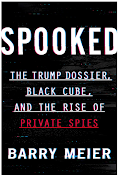via Wired Magazine...
Years ago, while stationed
in Moscow as the bureau chief for a major news magazine, I was
approached by a representative of a multinational company and presented
with a tantalizing offer. He said he had highly sensitive materials
exposing possible criminal activity by a Russian competitor. The
documents were mine with one condition: advance notice so he could be
out of the country when any story was published.
I had every reason to think the materials came from a private intelligence operative hired by the company—there were many such operatives in Moscow—but I didn’t ask my source for his source. Instead I embarked on a somewhat harrowing investigation of my own, and on corroborating the materials, I was able to publish a splashy story.
This episode came back to me while reading Barry Meier’s new book, Spooked: The Trump Dossier, Black Cube, and the Rise of Private Spies. A former New York Times investigative reporter, Meier casts a harsh light on both “private spies” and journalists who make frequent use of nuggets unearthed by these operatives. In the book’s afterword, he revives an idea for “a kind of ‘spy registry’ in which operatives for hire would have to disclose the names of their clients and assignments,” just as Congress now requires of lobbyists hired to influence legislators.Is this truly a problem in need of a solution? Or would a spy registry create worse problems?
It’s tempting to conclude that there is really nothing new here and that private spies may even supply a public service. In the original, late-19th-century Gilded Age, the Pinkerton Detective Agency devoted itself to the art of subterfuge. In 1890, a Pinkerton man went undercover on behalf of his client, the governor of North Dakota, and confirmed from rigorous barroom investigation that a fair amount of “boodle,” bribe money, was being dispensed by advocates of a state lottery opposed by the governor. The governor revealed the dirty dealings to the public, and the lottery scheme failed—all perhaps to the civic good.Today’s
circumstances are far different. Inexpensive, off-the-shelf
technologies for surveillance, hacking, and spoofing make the spy game
easier to play than ever before. What hired sleuth doesn’t now travel
with one of those metallic-fabric bags that blocks cellphone GPS
signals, like the GoDark Faraday model that sells online for $49.97?
It’s an insignificant item on the expense report. more


